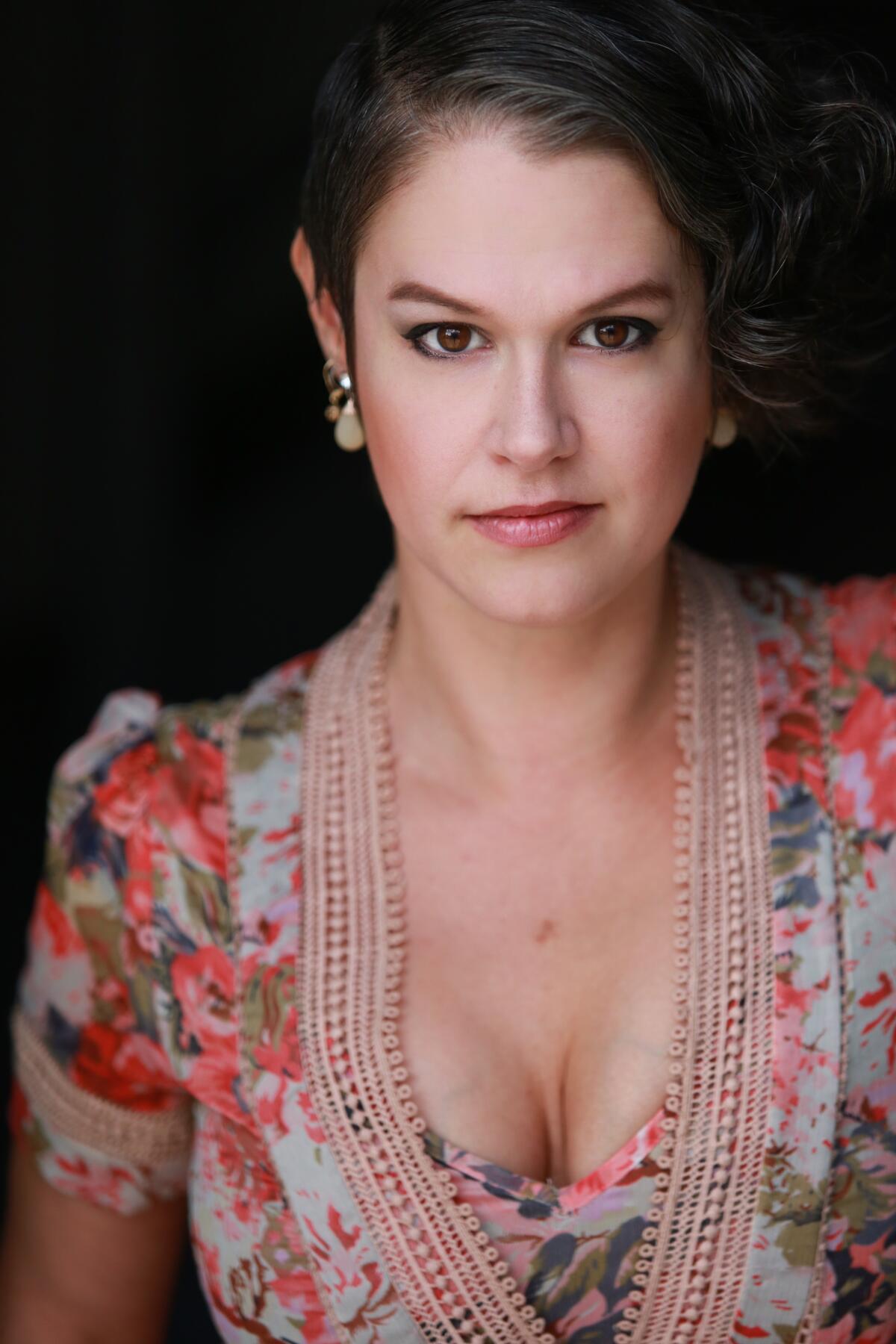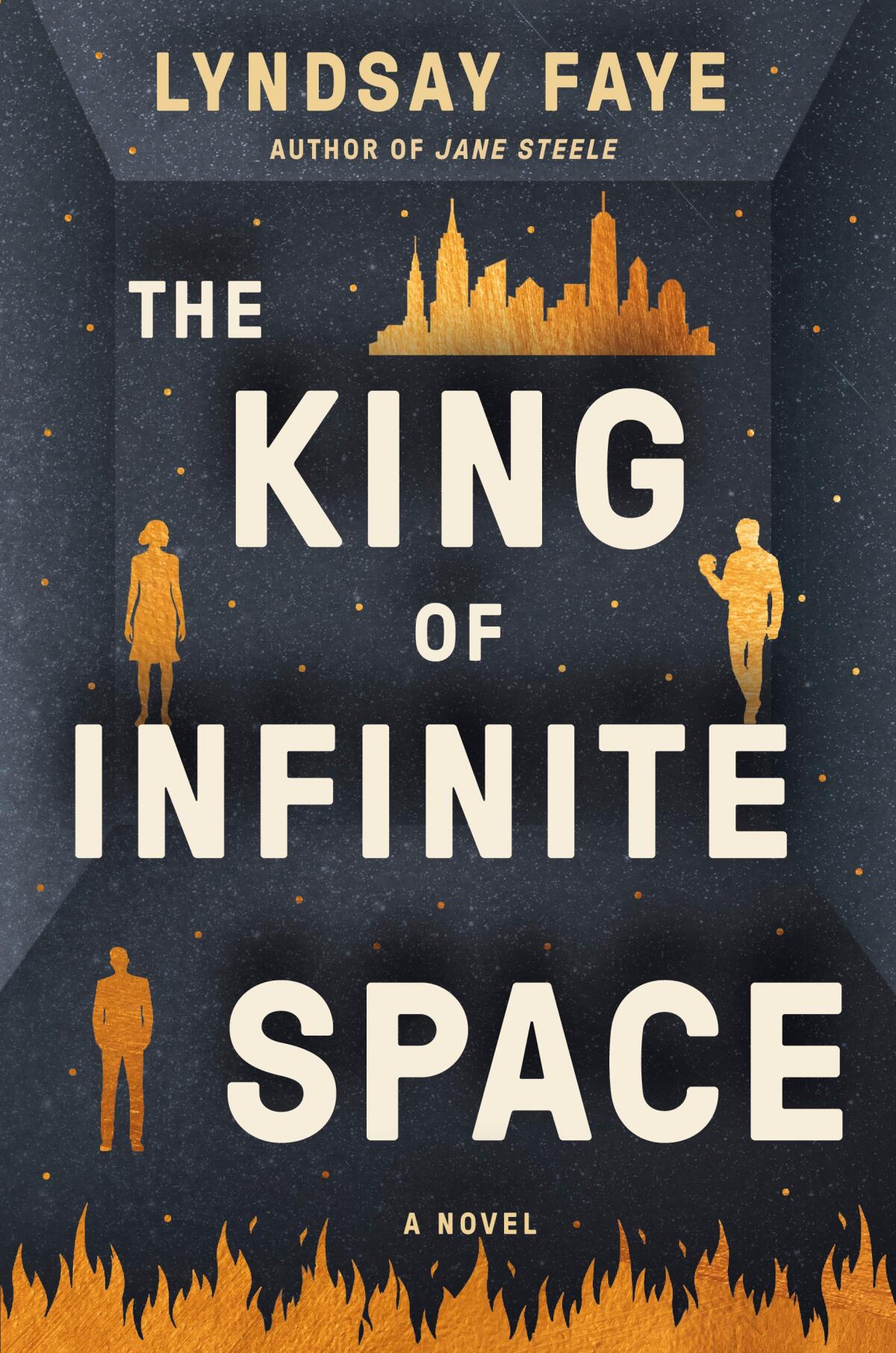Review: Murder most modern: A present-day ‘Hamlet’ throws in some twists and a lot of fun

- Share via
On the Shelf
The King of Infinite Space
By Lyndsay Faye
Putman: 384 pages, $27
If you buy books linked on our site, The Times may earn a commission from Bookshop.org, whose fees support independent bookstores.
Lyndsay Faye plays a kind of literary jazz. The author likes to riff on the standards, putting her own stamp on them as she jams. Her previous novels include inventive takes on Sherlock Holmes (“Dust and Shadow”) and “Jane Eyre” (“Jane Steele”). Her Timothy Wilde detective series and her novel “The Paragon Hotel” infuse a contemporary sensibility into gritty, evocative historical fiction.
Faye’s new novel, “The King of Infinite Space,” brings Shakespeare’s “Hamlet” into the present day. The contemplative Danish prince becomes Benjamin Dane, the scion of a wealthy New York City family. His father, Jackson, comes from Texas oil money but chose to spend his life running an avant-garde theater company. After Jackson dies of an overdose, his widow, Trudy, quickly marries his brother Claude. Benjamin, buffeted by this sea of troubles, discovers a video Jackson made shortly before his death, in which he says his brother is out to kill him. Set on discovering the truth, Benjamin enlists his best friend Horatio, with whom he has a complicated romantic past, to help him investigate. Lia, Benjamin’s ex-fiancée, works for the Three Sisters Florist Boutique, whose proprietors — a trio of seemingly ageless women from New Orleans — appear to provide their customers with a whole lot more than artful bouquets.
In addition to the obvious homages to Shakespeare’s most quoted play, then, we have the witchy “Macbeth” reference and — in a character named Robin Goodfellow — a nod to “A Midsummer Night’s Dream.” There are more subtle linguistic nods. Benjamin, for instance, thinks “there’s been something in the air since [his] father died, something toxic and stifling,” something “tangible, the rotting taste.” Shakespeare novices may or may not miss the quotes; aficionados will find themselves assaulted with the slings and arrows of lyrical literalism.
“All’s Well,” Mona Awad’s delightfully odd but strangely noncommittal new novel, concerns a woman who overcomes her ailments in Shakespearean ways.
What rescues “The King of Infinite Space” is what Faye chooses to change in the story (in the spirit of the Bard, the original master of rebooted IP). Her protagonist, the charming and mercurial Benjamin, is a compelling and complex version of Hamlet. A student of philosophy with a neurodiverse mind, Benjamin wrestles with the big ideas of heaven and earth, his Hamlet-like semi-madness abetted by pills. Faye creates a love triangle between Benjamin, Lia and Horatio that forms the emotional center of the story. Most believable and winning — and farthest from its source — is the romance between the two men.
It’s also very funny. Benjamin thinks of one of the detectives investigating Jackson’s death, a ne’er-do-well named Barry Fortuna, as a “comprehensive runny cow tit.” A list of people he’d like to strangle to death includes “whoever wrote the Kars4Kids commercial.” The novel’s Rosencrantz and Guildenstern, a pair of entitled bro-dudes named Rory and Garett, bring gibes and gambols into the mix (though no one will ever best Tom Stoppard’s duo in “Rosencrantz and Guildenstern Are Dead”).

Inserting considerable jest into the novel while staying true to the spirit of the play is quite a feat. Consider the key supporting players in the original, Ophelia and Horatio. Horatio famously closes the play with a bravura first draft of history after Hamlet is slain. He is a scholar in the play; Faye, craftily, makes him an aspiring biographer.
After her father, Polonius, dies, “Hamlet’s” Ophelia sinks into intense grief, “speaks things in doubt / That carry but half sense,” as Queen Gertrude puts it, and uses the symbolism of flowers to describe her pain. Lia, Ophelia’s counterpart in Faye’s novel, is a florist who describes her emotional reactions via the bouquets she constructs. When Benjamin tells her, “You were always everything to me,” we get: “Heliotrope: Endlessly devoted affection. Cowslip: You are my divinity. Helenium: Weeping.”
As the Senate impeachment trial gets underway, Shakespeare’s tragedy illuminates the politics of rebellion and the quest to maintain a grip on power.
Faye’s descriptive language evokes — and has fun with — the theatricality of Shakespeare. Her rendering of the three sisters’ home captures the spirit of this book’s magic: “Their rooms swell to suit them. The two floors above the flower shop are walled with recessed shelves groaning with exotica, esoterica, erotica, idols, cookbooks, crystals, antique perfume atomizers, and one statue of the Virgin Mary decked in Mardi Gras beads. Lia was exploring once and came upon a baby grand piano. She never found it again.”
There are times when a reader may wish Faye had taken more liberties with the dramatic arc, if only to make the conclusion less predictable. Yet her two greatest divergences come in the form of plot twists. One involves Lia, the other Jórvík — Faye’s reinvention of Yorick, the dead jester whose skull Hamlet honors in the graveyard. Both twists are quite jarring. They work, ultimately, but not without a bit of narrative readjustment. Jórvik is not a man of most excellent fancy but rather something far more sinister. And Lia’s relationship with the sisters upends Ophelia’s narrative. These departures will come as less of a surprise to Faye’s regular readers, who watched her turn Jane Eyre into a serial killer.
This above all: “The King of Infinite Space” is both a fleet-footed delight and a true tragedy in the classical tradition of its source. It is a tragicomedy, a hybrid of past and present, a pastiche and an original yarn, a verily fun and achingly melancholy novel. All this, Faye can truly deliver.
Clark is the author of “An Oasis of Horror in a Desert of Boredom” and the forthcoming “Skateboard.”
Melanie Andrews is the artistic director of Inner City Shakespeare, a growing network for Black and Latino performers to make it in entertainment.
More to Read
Sign up for our Book Club newsletter
Get the latest news, events and more from the Los Angeles Times Book Club, and help us get L.A. reading and talking.
You may occasionally receive promotional content from the Los Angeles Times.








